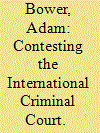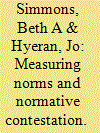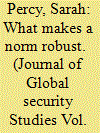|
|
|
Sort Order |
|
|
|
Items / Page
|
|
|
|
|
|
|
| Srl | Item |
| 1 |
ID:
164463


|
|
|
|
|
| Summary/Abstract |
Following the attacks of 9/11, the United States adopted a policy of torturing suspected terrorists and reinterpreted its legal obligations so that it could argue that this policy was lawful. This article investigates the impact of these actions by the United States on the global norm against torture. After conceptualizing how the United States contested the norm against torture, the article explores how US actions impacted the norm across four dimensions of robustness: concordance with the norm, third-party reactions to norm violations, compliance, and implementation. This analysis reveals a heterogeneous impact of US contestation: while US policies did not impact global human rights trends, it did shape the behavior of states that aided and abetted US torture policies, especially those lacking strong domestic legal structures. The article sheds light on the circumstances under which powerful states can shape the robustness of global norms.
|
|
|
|
|
|
|
|
|
|
|
|
|
|
|
|
| 2 |
ID:
164462


|
|
|
|
|
| Summary/Abstract |
The International Criminal Court (ICC) is the centerpiece of an expanding international norm of nonimpunity, which holds that all individuals should be equally subject to accountability for atrocity crimes. Despite rapid institutional growth, the ICC faces a number of challenges, including enduring resistance to the prosecution of senior state officials. Over the past decade, a number of African states have attempted to suppress ICC cases against Sudanese President Omar al Bashir and Kenyan President Uhuru Kenyatta and enshrine formal exemptions from ICC jurisdiction for sitting Heads of State. In this article, I focus on the dynamics and impact of contestation in a highly institutionalized environment. The ICC is embedded within a dense network of overlapping legal rules and norms and, as a consequence, debates over its operation and legitimacy are primarily undertaken via the distinctive discourses and practices of international law. I argue that, despite often vociferous challenges, contestation surrounding Bashir and Kenyatta has not led to an erosion of the nonimpunity norm because challenges have been largely conducted through modes of “applicatory contestation” that are less damaging to the foundational validity of the norm. Legalization has thus played a dual role, providing strategic justifications for attempts to narrow the scope of nonimpunity, but also empowering counter-contestation by pro-norm constituencies.
|
|
|
|
|
|
|
|
|
|
|
|
|
|
|
|
| 3 |
ID:
164458


|
|
|
|
|
| Summary/Abstract |
One way to tell if an international norm is robust is to assess the breadth of its support from a wide variety of important actors. We argue that, to assess norm robustness, we should look at the general beliefs, rhetorical support, and actions of both primary and secondary norm addressees (states and nonstate actors) at various levels: international, regional, domestic, and local. By way of example, we evaluate the robustness of international criminal law (ICL) norms by looking at the rhetoric and actions of a diverse set of international actors, including not only states and intergovernmental organizations but also ordinary publics, rebel groups, and nongovernmental organizations. Assessing evidence of norms beyond states leads us to conclude that the core ICL norms are robust, but their practical and institutional applicability are still contested. Contestation over applicability is important, and there are hints that it is growing, at least among some key actors, suggesting the possibility of ICL norm decay.
|
|
|
|
|
|
|
|
|
|
|
|
|
|
|
|
| 4 |
ID:
164465


|
|
|
|
|
| Summary/Abstract |
The collaborative project reported in this special issue has sought to move beyond any straightforward connection between norm violation or norm contestation, on the one hand, and norm robustness on the other. Instead, the effects of contestation on norm robustness are conditioned by characteristics of norm challengers and norm defenders, by the nature of the contestation, and by features of norm institutionalization and embeddedness. This contribution assesses the case studies in light of the framing conjectures. It draws broad conclusions, indicates areas where general conclusions are not yet possible, and points out directions for further theoretical development and empirical investigation.
|
|
|
|
|
|
|
|
|
|
|
|
|
|
|
|
| 5 |
ID:
164461


|
|
|
|
|
| Summary/Abstract |
Using the example of the right to self-defense under customary international law, we engage with questions concerning the linkage between norm robustness and legality. We draw out important differences between validity contestation and applicatory contestation within law. In so doing, we connect the international relations (IR) debate over norm robustness with our framework of interactional international law, bringing together constructivist insights into social normativity and a theory of international legality. We hypothesize that norms that meet the requirements of legality and are upheld by practices of legality enjoy “validity” and “facticity” (as defined by Deitelhoff and Zimmermann) and are “robust.” This model reveals that law operates through a continuing process of contestation. The requirements of legality impose a discipline, such that legal contestation will normally be applicatory contestation. Through practices of legality, therefore, legal norms can be maintained or shifted. However, legal norms may decay when practices of legality weaken or when challenges amount to validity contestation. The currently heightened contestation surrounding the circumstances under which the right to self-defense can be exercised against nonstate actors allows us to explore and illustrate of these dynamics.
|
|
|
|
|
|
|
|
|
|
|
|
|
|
|
|
| 6 |
ID:
164460


|
|
|
|
|
| Summary/Abstract |
This article begins by critically assessing some of the current measures used to evaluate the status and impact of the Responsibility to Protect (RtoP). It then lays the groundwork for a deeper examination of RtoP's strength by specifying what kind of norm it is, and what it can reasonably be expected to do. The third section engages Zimmerman and Deitelhoff's framework on norm robustness and contestation by positing two arguments. First, the past decade of diplomatic engagement and policy development has brought about greater consensus on RtoP's core elements, and thus enhanced its validity; however, this process has also dampened many of RtoP's original cosmopolitan aspirations. Second, persistent applicatory contestation about RtoP's so-called third pillar is revealing deeper concerns about the norm's justification – thereby leading some actors to avoid framing situations with RtoP terminology. I use two cases to address the broader theoretical questions raised about whether and how language matters in assessing norm robustness: the international community's response to the deepening political violence in Burundi in 2015, and the evolution of the international community's response to the war in Syria (2011–17). While these cases illustrate changing perceptions of the political utility of RtoP language, concrete engagement by the international community, particularly in the Burundi case, indicates that RtoP's validity remains intact. The article concludes that norm decay is not equivalent to norm death, and that RtoP's prescriptions will survive given that they are embedded in a broader normative structure of human rights, humanitarian law, and civilian protection.
|
|
|
|
|
|
|
|
|
|
|
|
|
|
|
|
| 7 |
ID:
164457


|
|
|
|
|
| Summary/Abstract |
The introduction develops this special issue's main research question: under which conditions are challenges to norms likely to decrease their robustness? The issue presents current research on contestation and norm robustness and discusses its limitations. We conceptualize a norm's robustness by examining both the practical and discursive dimensions. Robustness is high when norm addressees express widespread discursive acceptance of a norm's claims (validity) that also generally guide addressees’ actions (facticity). When normative claims are discursively rejected by most addressees and do not guide their actions, robustness is low. The contributions develop four broad indicators for measuring robustness (concordance, third-party reactions to norm violation, compliance, and implementation). The norms analyzed here were not easily eroded; despite direct challenges, they remained surprisingly robust. This indicates that norm robustness is not determined by the relative power of norm challengers, but rather types of contestation and structural factors. These include being embedded in larger normative structures, institutionalization, and legal character, although effects of these factors are more ambivalent than norm research has usually supposed.
|
|
|
|
|
|
|
|
|
|
|
|
|
|
|
|
| 8 |
ID:
164459


|
|
|
|
|
| Summary/Abstract |
Has the use of chemical weapons (CW) in Syria eroded the CW taboo? In this article I argue that, despite the significant violations of the CW taboo in the Syrian conflict, the trend overall is not indicative of the erosion of the long-standing international norm that prohibits the use of chemical weapons in warfare. I consider evidence that supports but could also challenge such an assessment, drawing upon indicators for norm robustness and erosion, including the nature of the violations, reactions to violations by third parties, concordance in belief and practice, and implementation and institutionalization.
|
|
|
|
|
|
|
|
|
|
|
|
|
|
|
|
| 9 |
ID:
164464


|
|
|
|
|
| Summary/Abstract |
The norm against female combat participation has been powerfully influential and extremely slow to change, despite a record of violation and concerted attempts by states to overturn it. As a result, it is a useful lens through which to examine the factors that make norms robust. I examine two junctures for where the norm has been tested but not overturned: World War II and the slow shift by some states to incorporate women into their militaries beginning in the 1980s. These instances reveal two important elements of norm robustness: (1) the degree to which norms are embedded with other norms is essential to understanding why the norm gained strength after women participated in World War II, and (2) the absence of legalization and norm entrepreneurs explains why the integration of women in the 1980s and onward has not overturned the norm. The article also examines other features of norm robustness, particularly the notion that norms that are both procedural and ethical in character will be more robust, and that the behaviour of powerful states does not always cause norm diffusion through the international system.
|
|
|
|
|
|
|
|
|
|
|
|
|
|
|
|
|
|
|
|
|